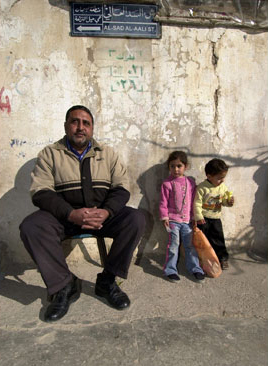The Iraqi embassy in Amman is organising the repatriation by plane of dozens of Iraqi families who wish to return home, despite warnings from UN agencies about the security situation.
Iraqi diplomats in Amman said they had chartered a plane to repatriate the Iraqis later this week, during the Muslim holiday of Eid al Fitr.
Disabled people and the elderly will be among the Iraqis leaving in what, according to the Iraqi ambassador, will be the first official return by air to the homeland since the US-led invasion in 2003.
"We have received at least 500 requests from Iraqis in Jordan who want to return home, and we are doing our best to facilitate their return," said Iraqi ambassador in Amman Saad Hayani.
Officials in Baghdad say the security situation has improved and that the number of attacks by insurgents has dropped by around 80 percent since 2003.
Rear-Adml Gregory Smith, a senior US military spokesman, said violent incidents in Iraq had fallen to their lowest levels since summer 2005. Iraqi civilian casualties were down 60 percent (and had dropped 75 percent in Baghdad) since June, Smith said.
Those wishing to return have been offered financial incentives to help them resettle, and received assurances that they would be able to get back any property seized since 2003.
 Photo: P.Sands/UNHCR  |
| A restaurant popular with Iraqi refugees living in downtown Amman acts as an information centre for those wishing to monitor conditions at home |
Iraqi officials said some Iraqis had already begun to return home overland, following improved security along the 500-km long road between the border and Baghdad. Travel agents in Amman, however, said they had witnessed little, if any, increase in the number of Iraqis heading home overland.
"For now, it’s business as usual. There are a small number of Iraqi families returning home by land… Most returnees are business people taking goods with them and vehicles to sell, but few families are among them," said travel agent Mohammed al-Far.
Sattar, an Iraqi refugee who arrived in Jordan from the al Mansour area in Baghdad, said the Iraqi community did not trust the current government or its claims about improved security.
Other Iraqis in Amman said only those who had lost their savings or who had legal problems with the authorities in Amman, or had failed to obtain visas for Western countries, were opting for repatriation.
UNHCR
Officials from the UN Refugee Agency (UNHCR) are reluctant to encourage Iraqis to return home, sighting the security situation.
"The UNHCR does not consider that, at present, conditions are such inside Iraq as to encourage repatriation. However, if an Iraqi takes a decision to return voluntarily and based on sound information, we will support such a return on an individual case basis," said UNHCR deputy representative Jamal Arafat in a statement to IRIN early in September.
"Once it is clear that the decision to return is voluntary, the choice of transport is open. If the Iraqi government is making available air transport for Iraqi refugees to return, we would have no problem for properly vetted returnees to repatriate by this means," he added.
Jordan is home to nearly half a million Iraqis.
mbh/at/cb
This article was produced by IRIN News while it was part of the United Nations Office for the Coordination of Humanitarian Affairs. Please send queries on copyright or liability to the UN. For more information: https://shop.un.org/rights-permissions




